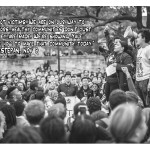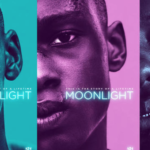
My first “I love you” filled the air when I was sixteen in the cold basement of a new model suburban home. The air emanating from the concrete walls was chilly because it was near Christmas or just past. I can’t quite remember now. I do remember the flush, the warmth shooting out from my heart, nearly beating out of my chest, reaching my fingertips and the tops of my cheeks. The embrace that followed and the ache from smiling too hard. He’d said it first, and I’d meant it more, but none of that had started to matter yet because in that contained moment we had both spoken truly.
To be sixteen is to exist in a specific period of life. To be sixteen is not to be thirty-four, and to be twenty is not to be eleven. These are not just numbers but completely different spaces occupied in existence. The various you’s that exist within various stages of your life all have vastly different concepts of true love and of deep love. These versions of self have different values, passions, and outlooks.
When you are eleven and carrying bagged lunches to school you may find yourself falling for the boy that trades his crackers for your goldfish. At fourteen, it’s the girl whose eyes linger on you a little longer than anyone else–they’re such a pretty brown. At seventeen there is a magnetism to the confidence of that person in third period Spanish. It’s impossible to resist–and they have a car!
Teen love is puppy love and that’s immature, and young hearts don’t know enough for it to be more. There is some agreement among individuals older than 25 that any love one had as a teenager is less than a love that might have occurred past the age of 20. They claim that in a lifelong search to experience “true love” these romances which occur during our adolescence –what very well may be the most evolutionary period of a person’s life– are, in a way, less “true.” That six months at thirty is more “real” than six months at fifteen.
I feel that we disillusion ourselves implying that something true is everlasting or confined to a certain space and time. When we do this we discredit things that have since ended or began in a less desirable temporal point. It is simply untrue to say that true love must happen at the right time and last forever or it was never true.
Even if we decided to follow this false definition of true love, who is to say that forever couldn’t continue its course for a specific version of self. Moving past a singular existence is inevitable. However, once you evolve into a new you with new values and a new concept of true love, a new forever starts. The commencement of a new contained forever allows the old love to continue existing in the old stage for the old you.
I am not the same person I was when I was sixteen. I love differently now, I seek different love.
I’m midway through my twentieth year and I refuse to look down on my 16-year-old self (for falling in love anyway). She made mistakes, missteps, and miscalculations, but who am I to judge her when three years from now my 22-year-old self will likely be doing the same, scrutinizing each romantic encounter I had as an undergrad. Self-reflection as a means to self-awareness and betterment is key to improving as an individual. This process does not need to be accompanied by judgment or invalidity.
To reflect should not be self-punishing.
I do not love him anymore. I do not carry him fondly in my heart. I have grown new muscle in the places that rotted. The hollowed-out carcass has found new life in a new figure. My nineteen-year-old self has no space for him. I firmly believe however that this in no way discounts the overwhelming space he took up in my sixteen-year-old body.
I haven’t been in love since. When I do have the privilege I won’t use the experience to discredit the previous one. Love is real at the moment it occurs, for as long as that moment lasts. No more. No less.
Teenagers love in a way that is different from their adult counterparts, it is fast-paced, possibly short-lived, sheltered, a bit careless, but it is not lesser.
Anaiis Rios-Kasoga ’25

